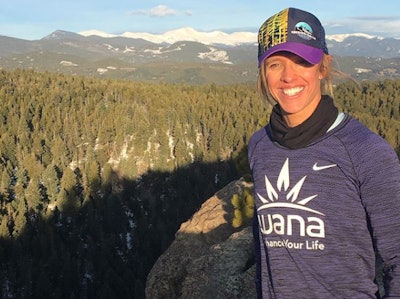
Long-distance runner Flavie Dokken is partnering with Wana Brands to promote cannabis products as a beneficial element of athletes’ training and pain relief regimen. Before her workouts and after, Dokken uses cannabis products to accentuate her endurance and her strength, echoing a broader trend among professional athletes. Wana Brands has taken notice.
“With Wana – especially with Wana being in Boulder – I was well aware of the brand,” Dokken says. “I really loved what they were doing with the community … and the culture and the way they were approaching the industry.”
Dokken’s cannabis use began in the aftermath of her time in the U.S. Army. She came home to nurse a stress fracture and ongoing chronic pain. To deal with the physical ailments, she started experimenting with cannabis
From there, Dokken embarked on a career as a professional bodybuilder and continued her cannabis experiments.
In recent years, she has become a competitive ultramarathoner in Colorado; this year; she's eyeing several 100k races. In February, she clocked a 6:50 mile pace in the Mad Moose Pueblo Half Marathon. Whether she’s lifting in the gym or running on the trail, Dokken has found success in accenting her workouts with CBD-rich edibles and capsules.
“The first way I tried it was after workouts, kind of to alleviate the pain,” she says. “Also, it’s very beneficial to bring your body back to some balance—your heart rate and everything—especially when it comes to extreme sports.”
With the spectrum of products and delivery systems available on the market today, including Wana Brands' highly visible gummie line, it's easier than ever to blend cannabis into an athletic training routine. Whether athletes should or not is a question that begets numerous considerations, like professional league policies, health ramifications and, on some level, a persistent social stigma. Dokken says that cannabis’ mental effects are just as important as its physical effects.
Her favorites are the 1:1 gummies, which “help toward the end of the workout just to have that extra bump to alleviate the pain and then also for recovery,” she says. “As far as strains, for focus for a run or even lifting, I love Durban Poison. It’s like 10 cups of coffee with great focus, and then it just wears out. That’s my go-to.”
Out on the course, though, obstacles are rampant: The U.S. Anti-Doping Agency, for example, uses the World Anti-Doping Code in its drug-testing protocol. CBD products are accepted; THC and other cannabinoids, however, remain prohibited. Runners who are listed in a national or international testing pool must maintain accurate “whereabouts” information, so that USADA officials may find them and complete the occasional random drug test, as Runner’s World reports.
As CBD product sales continue to soar in state-legal recreational markets, the number of athletes willing to open up about their cannabis use may eventually rise. (Athletes of any professional status should, of course, consult with their respective league or association about cannabis policies.)
Dokken says the benefits, for her, are legion: Athletes can improve their training by “just being in tune with your body.” It’s vital to know what’s working and what’s not working—and where one’s threshold of pain lies.
“During the long runs, it’s just nice to be able to be distracted from the pain a little bit and to keep pushing your training,” Dokken says. “It’s a great tool where you can actually train better and also recover faster.”
Dokken calls Boulder the “Mecca” of endurance sports. With Colorado’s adult-use cannabis market growing steadily since 2014, the state is a natural intersection for the world of outdoor activities—endurance sports like Dokken's marathons—and cannabis use.
“Wana Brands has seen first-hand how cannabis can improve the overall well-being of athletes, and we are dedicated to providing athletes with the relief and aid they are seeking,” said Nancy Whiteman, founder and CEO of Wana Brands. “We are honored to get to partner with Flavie, who has a mutual appreciation of cannabis as a tool for recovery, to advocate for the use of cannabis as a natural remedy among athletes.”
Beyond the promotional work, Dokken says that there is much ground to cover in combating the cultural barriers to cannabis use in professional athletics. She says that most of the community does consume cannabis—“especially CBD products”—but that she’s run into fellow athletes who aren’t comfortable even following her on Instagram, lest their coaches or partners find out.
“I’m so frustrated with all the stigma that remains and the perception,” Dokken says. “I’m very open and want to promote consumption among athletes and break boundaries.”
She's not alone. Former NFL player Marvin Washington recently spearheaded a federal lawsuit that sought to remove cannabis from the U.S. government's list of controlled substances. In February, a judge dismissed the lawsuit while admitting that his ruling "should not be understood as a factual finding that marijuana lacks any medical use in the United States."
Elsewhere, former NFL player Ricky Williams established his own "cannabis-based wellness brand" called Real Wellness. Williams also co-founded The Power Plant Gym, which takes a friendly stance toward cannabis use.
The NFL has responded to players’ outspokenness by offering to work with the NFL Players Association to study the pain management effects of cannabis. And in the NBA, commissioner Adam Silver has voiced a degree of support for medical cannabis use, saying last fall that he’s “convinced that cannabis does have medicinal qualities and should be taken off the league’s list of banned substances.”
Dokken says that it’s a process that will unfold through individual conversations and incremental policy shifts in professional athletic leagues and associations.
Athletes—and all consumers—can find Wana Brands products in Colorado, Oregon, Nevada and Arizona. The company is planning to expand into Illinois, Florida, Maryland, Pennsylvania, California and Canada.
Top photo courtesy of Flavie Dokken | @flavester

























